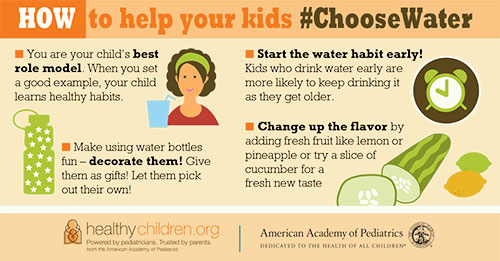By: Janine Rethy, MD, MPH, FAAP
All living things need water to survive. Along with milk, plain water is the best drink choice for kids. Why? It's super healthy with zero calories & no added sugar. It good for the body - keeps joints, bones and teeth healthy, helps the blood circulate, and can help kids maintain a healthy weight into adulthood. Being well hydrated improves mood, memory and attention in children . And it's economical – tap water is much less expensive than sports drinks, sodas and juice.
Here are some tips on how to help your family choose water.
How much water do children need?
At around 6 months, babies can be introduced to water. They only need about 4-8 ounces per day until they are a year old because the rest of their liquids are coming from breastmilk or formula.
To stay well hydrated, children ages 1-3 years need approximately 4 cups of beverages per day, including water or milk. This increases for older kids to around 5 cups for 4-8 year olds, and 7-8 cups for older children.
It should be noted that these
amounts vary by individual and may need to be adjusted depending on levels of activity and environmental conditions like heat and humidity.
How to help your family choose water
Water doesn't have to be boring! There are plenty of ways to entice everyone in the family to drink healthy and stay hydrated throughout the day. Being a good role model yourself is a great way to help make water part of your children's routine and gets them in the habit of drinking water before they're thirsty. Here are a few twists to add some fun:
Infuse water with lemons, berries, cucumber or mint for some added flavor. This is an easy way to keep the whole family coming back for refills.
Keep fruits and vegetables that are high in water content handy - and there are plenty of them. Some of the best vegetables to choose from are cucumber, zucchini, iceberg lettuce, celery, and tomato. Top fruits include watermelon, cantaloupe, strawberries, blueberries, and grapefruit.
Freeze fruit inside ice cubes. It dresses up the drinks at any table, and young children can help fill the trays.
Delight kids with special water bottles or cups. Whether it is a personalized sports bottle or a fancy cup with an umbrella or swirly straw, adding a festive touch can go a long way.
Make your own popsicles with pureed fruit for an afternoon cool-down. Make it a fun family activity by using small paper cups. Let your kids decorate them before filling or look for popsicle molds in fun shapes and colors.
Drinks to limit
Water and milk are all the drinks kids need. So don't believe all the hype surrounding many of the other drinks marketed to kids. These usually contain way more sugar than children need in a day and can contribute to poor health. Here's what to avoid:
Sugary drinks: Make a rule: no
sugar-sweetened beverages for your children who are less than 2 years of age. And try to limit them for your older children as much as possible. This includes sports drinks, juice cocktails, sodas, lemonade, and sweetened water. These drinks discourage a habit of drinking plain water, and can add extra “empty calories" to the diet. They can also leave your kids less hungry for the nutritious foods they really need. Added sugars can lead to excess weight gain, dental cavities, diabetes, and more.
Juice: Even 100%
juice should be strictly limited. While it can contain some vitamins, these drinks are high in sugar and calories and low in the healthy fiber found in whole fruit. Because of its sweet taste, once children are offered juice, it can be difficult to get them to drink plain water. Keep these amounts in mind:
Children less than a year should not drink any juice at all.
Children 1-3 years of age should have no more than 4 oz per day.
For older children, juice is only recommended if whole fruits are not available. Children ages 4–6 years, no more than 4–6 oz per day, and for children ages 7–18, no more than 8 oz per day.
Flavored milk: Even though you get the benefits of the calcium and vitamins found in milk, flavored milk can be much higher in sugar. These added sugars should be avoided to discourage a preference for sweet flavors, which can make it difficult to have success when offering regular milk.
Stevia- or artificially-sweetened drinks: Because health risks for children from stevia and
artificial sweeteners are not well understood, it is best to avoid these drinks. Instead, make water readily available to encourage healthy hydration.
Signs of dehydration
Even with the best habits and intentions, trouble can arise. It is important to know the signs of
dehydration so you can address them quickly.
Infants 0-6 months should only be drinking breast milk or formula. Additional water is not recommended at this age. Around 6 months, complementary foods and small amounts of water can be added. If you are worried that your infant is not getting enough to drink, call your pediatrician immediately. The most noticeable symptoms of dehydration in this age are:
Fewer wet diapers, with the typical range being from 6 to 8
Overly sleepy
Sunken soft spot (fontanelle) on the baby's head
No tears when crying
As children get older, they are better able to tell you how they are feeling. However, it is still necessary to keep an eye on them since children at play often have a hard time stopping. Symptoms in older children include:
In teens, dehydration is a big risk especially if they do high-intensity workouts or heavy team practices. Most common signs for this age group are:
Staying hydrated during sports, exercise or heat
 Being active is an important lifestyle choice for every member of the family. But during sports or other physical activities, your child may need additional water to prevent dehydration. For example, when taking part in sports, make sure your child drinks water before, during and after practices or games.
Being active is an important lifestyle choice for every member of the family. But during sports or other physical activities, your child may need additional water to prevent dehydration. For example, when taking part in sports, make sure your child drinks water before, during and after practices or games.
When exercising vigorously or sweating, children from 9-12 years of age generally need to drink about 3–8 ounces of water every 20 minutes to stay hydrated. Teens need to drink about 34–50 ounces per hour. It is helpful to stay well hydrated in the days and hours before activity begins. While playing at the park may not bring the same level of intensity, if your child is sweating, make sure they are adequately replacing fluids.
If vigorous exercise extends beyond 1 hour in a day or your child is sweating a lot, electrolyte-supplemented beverages may be necessary.
Heat-related illnesses
If your children do become dehydrated or overwhelmed in the heat, they are at risk for
heat exhaustion and heat stroke. Here's how you can tell the difference.
Heat exhaustion occurs from excessive sweating, causing dehydration and for the core body temperature to rise. If this happens, move your child out of sunlight to a cool place, rehydrate with cool water, wear light, cool clothes and use cold towels or ice packs to lower your child's body temperature. To be safe, if your child's symptoms are concerning or last more than an hour, talk with your pediatrician.
Heat stroke. Sometimes called sun stroke, heat stroke is the most serious. It is when the body overheats to a point where it begins to shut down. If your child is confused or unresponsive, has a rapid
pulse, or a
temperature over 103 degrees, immediate medical treatment is needed.
Remember
Staying properly hydrated keeps the body and mind running efficiently and feeling strong. Serve water with meals and snacks, and take those extra few minutes to pack the water bottles before your family heads out the door. Helping your children choose water first, and modeling this choice yourself, builds healthy habits that will pay dividends for a lifetime!
More information
About Dr. Rethy
 Janine Rethy, MD, MPH, FAAP, is Division Chief of Community Pediatrics at MedStar Georgetown University Hospital and Assistant Professor of Pediatrics at Georgetown University School of Medicine. She serves as Medical Director for the Kids Mobile Medical Clinic and FITNESS programs providing integrated, place-based primary care and wrap-around services through a health equity lens. Dr. Rethy is a member of the AAP's Council on Community Pediatrics and Sections on Obesity and Breastfeeding. She serves as an AAP COACH (Childhood Obesity Advisor for Continuing Health). For the AAP DC Chapter she serves as a CATCH co-facilitator and was recently elected as an at-large Board Member.
Janine Rethy, MD, MPH, FAAP, is Division Chief of Community Pediatrics at MedStar Georgetown University Hospital and Assistant Professor of Pediatrics at Georgetown University School of Medicine. She serves as Medical Director for the Kids Mobile Medical Clinic and FITNESS programs providing integrated, place-based primary care and wrap-around services through a health equity lens. Dr. Rethy is a member of the AAP's Council on Community Pediatrics and Sections on Obesity and Breastfeeding. She serves as an AAP COACH (Childhood Obesity Advisor for Continuing Health). For the AAP DC Chapter she serves as a CATCH co-facilitator and was recently elected as an at-large Board Member.